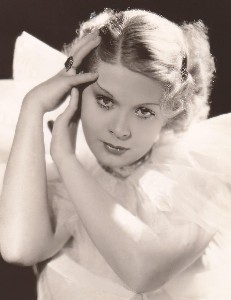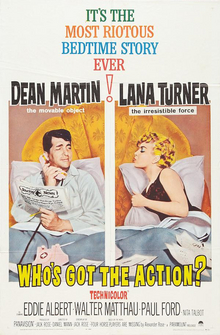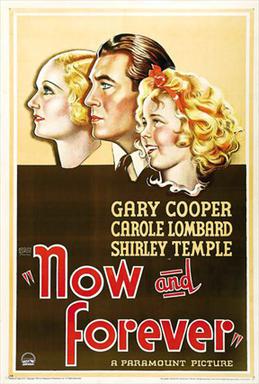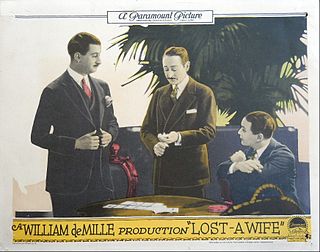
Alfred Damon Runyon was an American journalist and short-story writer.

Dorothy Dell was an American film actress. She died in an auto accident at the age of 19.

The Goldwyn Follies is a 1938 Technicolor film written by Ben Hecht, Sid Kuller, Sam Perrin and Arthur Phillips, with music by George Gershwin, Vernon Duke, and Ray Golden, and lyrics by Ira Gershwin and Sid Kuller. The Goldwyn Follies was the first Technicolor film produced by Samuel Goldwyn.

Sorrowful Jones, also known as Damon Runyon's Sorrowful Jones, is a 1949 American comedy-drama film directed by Sidney Lanfield. The film stars Lucille Ball and Bob Hope.

Who's Got the Action? is a 1962 American comedy film directed by Daniel Mann, from a screenplay by Jack Rose, based on the novel Four Horse Players Are Missing by Alexander Rose. It stars Dean Martin and Lana Turner, with Eddie Albert, Walter Matthau, Paul Ford and Nita Talbot. The film focuses on a man suffering from an addiction to gambling.

Dance, Girl, Dance is a 1940 American comedy-drama film directed by Dorothy Arzner and starring Maureen O'Hara, Louis Hayward, Lucille Ball, and Ralph Bellamy. The film follows two dancers who strive to preserve their own integrity while fighting for their place in the spotlight and for the affections of a wealthy young suitor.

Now and Forever is a 1934 American drama film directed by Henry Hathaway. The screenplay by Vincent Lawrence and Sylvia Thalberg was based on the story "Honor Bright" by Jack Kirkland and Melville Baker. The film stars Gary Cooper, Carole Lombard, and Shirley Temple in a story about a small-time swindler going straight for his child's sake. Temple sang "The World Owes Me a Living," introducing the future standard. The film was critically well received. Temple adored Cooper, who nicknamed her 'Wigglebritches'. This is the only film in which Lombard and Temple appeared together.
The Housekeeper's Daughter is a 1939 comedy/drama film directed and produced by Hal Roach. The film stars Joan Bennett, Adolphe Menjou and John Hubbard. The screenplay was written by Rian James, Gordon Douglas, Jack Jevne and Claude Martin, based on a novel by Donald Henderson Clarke.

Little Miss Marker is a 1980 American comedy drama film written and directed by Walter Bernstein and based on a short story by Damon Runyon. It stars Walter Matthau, Tony Curtis, Julie Andrews, Bob Newhart and new arrival Sara Stimson. The film is a remake of the 1934 film starring Shirley Temple and Adolphe Menjou.

Little Big Shot is a 1935 American film directed by Michael Curtiz, and starring Sybil Jason and Glenda Farrell. The film was released by Warner Bros. on September 7, 1935. The plot concerns a young girl who endears herself to her caretakers after her father is murdered by mobsters.

The Grand Duchess and the Waiter is a 1926 American silent romantic comedy film directed by Mal St. Clair and starring Florence Vidor and Adolphe Menjou. A “sophisticated comedy,” this Paramount production is based on a stage play by Alfred Savoir entitled La Grande-duchesse et le garcon d'etage (1924).

Are Parents People? is a 1925 American silent comedy film starring Betty Bronson, Florence Vidor, Adolphe Menjou, George Beranger, and Lawrence Gray. The film was directed by Malcolm St. Clair and released by Paramount Pictures.

The Show-Off is a 1926 American silent film comedy produced by Famous Players–Lasky and distributed by Paramount Pictures, based on the play of the same name by George Kelly. Directed by Mal St. Clair, the film stars Ford Sterling, Lois Wilson and Louise Brooks.

The Fast Set is a 1924 American silent comedy-drama film directed by William C. deMille and starring Betty Compson. The film is based on the 1923 Broadway play, Spring Cleaning, by Frederick Lonsdale.

The Kiss is a surviving 1916 American silent comedy film directed by Dell Henderson and written by Harvey F. Thew. The film stars Owen Moore, Marguerite Courtot, Kate Lester, Virginia Hammond, Adolphe Menjou, and Thomas O'Keefe. The film was released on October 19, 1916, by Paramount Pictures.
A Kiss in the Dark is a 1925 American silent comedy film directed by Frank Tuttle and written by Townsend Martin based upon a novel by Frederick Lonsdale. The film stars Adolphe Menjou, Aileen Pringle, Lillian Rich, Kenneth MacKenna, Ann Pennington, Kitty Kelly, and Zeppo Marx. The film was released on April 6, 1925, by Paramount Pictures.

Lost: A Wife is a 1925 American silent comedy film directed by William C. deMille and written by Clara Beranger based upon a play by Clare Kummer and Alfred Savoir. The film stars Adolphe Menjou, Greta Nissen, Robert Agnew, Edgar Norton, Mario Carillo, and Genaro Spagnoli. The film was released on July 13, 1925, by Paramount Pictures.

The Circus Queen Murder is a 1933 American pre-Code mystery film directed by Roy William Neill and starring Adolphe Menjou, Donald Cook and Greta Nissen. It is the sequel to the 1932 film The Night Club Lady in which Menjou had also starred as Thatcher Colt. The film is based on a story by "Anthony Abbott", a pseudonym used by Fulton Oursler.

John Sheehan was an American actor and vaudeville performer. After acting onstage and in vaudeville for several years, Sheehan began making films in 1914, starring in a number of short films. From 1914 to 1916, he appeared in over 60 films, the vast majority of them film shorts.
Little Miss Marker may refer to:

















